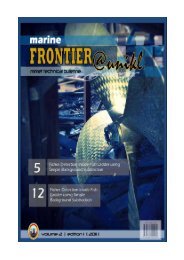click here to download - UniKL MIMET Official Website
click here to download - UniKL MIMET Official Website
click here to download - UniKL MIMET Official Website
Create successful ePaper yourself
Turn your PDF publications into a flip-book with our unique Google optimized e-Paper software.
Positive transformation from its traditional or‐<br />
ganizational culture <strong>to</strong>wards a performance‐<br />
driven culture helps <strong>UniKL</strong>’s success in remaining<br />
competitive and excelling in the areas of techni‐<br />
cal entrepreneurship. This success was mani‐<br />
fested through the Ministry of Higher Educa‐<br />
tion’s announcement on July 12, 2010 with re‐<br />
spect <strong>to</strong> the rating for Institutions of Higher<br />
Learning (Setara) that ex<strong>to</strong>lled <strong>UniKL</strong> as one of<br />
the <strong>to</strong>p 18 universities of Malaysia <strong>to</strong> attain the<br />
‘Excellent’ rating. This high rating is attributable<br />
<strong>to</strong> its entrepreneurial achievements driven by a<br />
strong organizational performance–driven cul‐<br />
ture. This culture refers <strong>to</strong> an accepted set of<br />
organizational core values that serve as the foun‐<br />
dation for the transformation process.<br />
LITERATURE REVIEW<br />
In transforming <strong>UniKL</strong>’s traditional culture <strong>to</strong>‐<br />
wards a performance ‐ driven culture the need<br />
<strong>to</strong> understand organizational structure and man‐<br />
agement styles across cultures was further ex‐<br />
plored (Dimitrov, 2005). Issues on culture, dif‐<br />
ferences, motivation, and diversity were ex‐<br />
plored in order <strong>to</strong> gain further understanding<br />
with regards <strong>to</strong> similar issues at <strong>UniKL</strong>.<br />
Exploring of culture dimensions (Hofstede,<br />
1980a) that identified dimensions along which<br />
organizational cultures differ, namely individual‐<br />
ism, uncertainty avoidance, power distance and<br />
masculinity help provide a glimpse of how those<br />
dimensions fit in<strong>to</strong> <strong>UniKL</strong>’s culture transforma‐<br />
tional drive. It was observed that the cultural<br />
dimensions as expounded by Hofstede were pre‐<br />
sent within the organizational culture of <strong>UniKL</strong><br />
but they were within a positive context namely,<br />
t<strong>here</strong> is a high degree of collectivism, low uncer‐<br />
tainty avoidance, low power distance and equal<br />
balance of gender responsibility. These observa‐<br />
tions would help inculcate stronger bonding<br />
among organizational members of <strong>UniKL</strong>.<br />
<strong>MIMET</strong> Technical Bulletin Volume 1 (2) 2010<br />
Examining the relationship between organiza‐<br />
tional culture and transformational leadership<br />
(Xenikou and Simosi, 2006) revealed that trans‐<br />
formational leadership of organizational culture<br />
influences organizational performance. The<br />
group further explored the findings <strong>to</strong> help it<br />
rationalize <strong>UniKL</strong>’s transformation from its tradi‐<br />
tional culture <strong>to</strong>wards one that ex<strong>to</strong>ls a perform‐<br />
ance driven organizational culture.<br />
<strong>UniKL</strong>’s organizational culture is uniquely differ‐<br />
ent from other institutions of higher learning<br />
because it focuses more on application of knowl‐<br />
edge (the hands‐on), without reducing the im‐<br />
portance of knowledge acquisition itself. Thus,<br />
further review (Rchildress and Esenn, 2006) on<br />
findings concerning the combination of knowl‐<br />
edge and skill that can be shared along the same<br />
parallels with <strong>UniKL</strong>’s transformation <strong>to</strong>wards a<br />
performance‐driven culture was sought. It re‐<br />
vealed, among other things, a finding that in or‐<br />
der <strong>to</strong> achieve high performance, the secret lies<br />
in developing personal core values and behaviors<br />
that can help unlock the potential power of high‐<br />
performance teams through individuals, which in<br />
turn, can help produce winning organizations.<br />
SIGNIFICANCE OF PAPER<br />
This paper is significantly important be‐<br />
cause it involves, among others, a specific study<br />
on the organizational culture of a local university<br />
that collectively bears part of a crucial common<br />
responsibility with other universities in helping<br />
<strong>to</strong> sustain Malaysia as a competitive nation in<br />
producing qualified and capable professionals<br />
through its training and educational system <strong>to</strong><br />
meet the increasing demands of Malaysia’s busi‐<br />
ness and industrial growth. In exploring further<br />
on how organizational culture may influence <strong>to</strong><br />
help achieve competitive advantage in an educa‐<br />
tional organization that produces qualified and<br />
| MARINE FRONTIER @ <strong>UniKL</strong><br />
97



